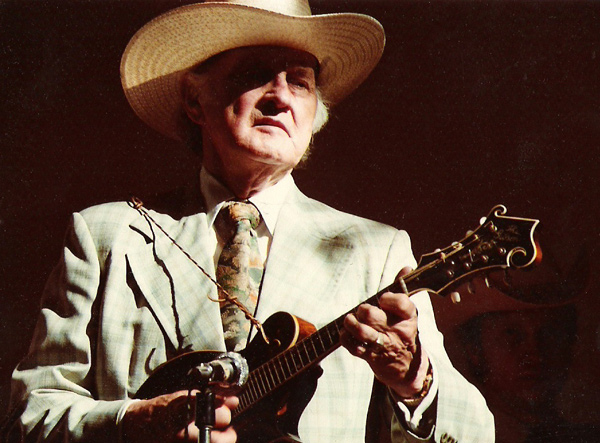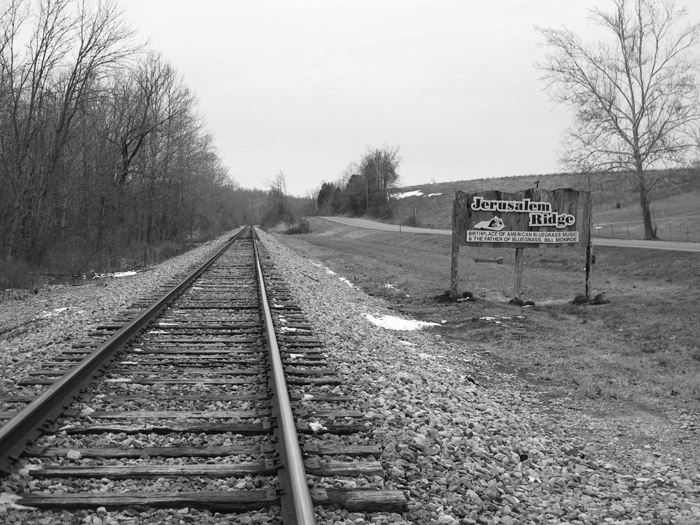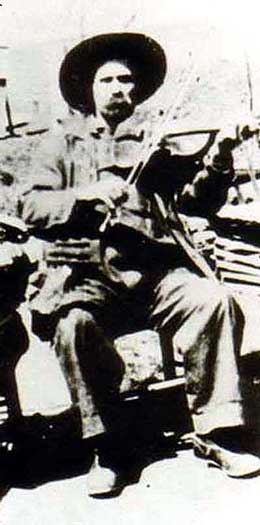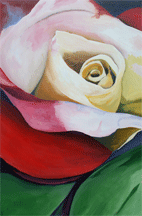A Bill Monroe Centennial Moment
‘I Have Always Been Proud of the People That I Came From In Kentucky’
Shaped by a life of hard, bare necessities and strong role models in the Kentucky mountains, young Bill Monroe’s music begins to take shape.
(Ed. Note: Nothing against Ronald Reagan--well, maybe a few things--but TheBluegrassSpecial.com feels the far more important centennial to celebrate this year is that of Bill Monroe, the Father of Bluegrass, who would have turned 100 on September 13. Mr. Bill is such a giant of American music that we are honoring his 100th birthday with a Bill Monroe Centennial Moment each month throughout 2011. Sometimes these will take the form of accounts of Monroe's influence on succeeding generations of musicians--as in February’s installment of how young Carl Perkins's discovery of Bill Monroe's music helped him develop the rockabilly rhythm he perfected in the honky tonks around Jackson, TN; sometimes we will look back at a signal moment in the artist's life, as we do this month in an excerpt from James Rooney’s vital Bossmen: Bill Monroe & Muddy Waters, in which the author examines the formative years of Monroe’s childhood in Rosine, KY, when, inspired by two strong male role models, young Bill began to find a musical voice unlike any other America had yet produced, and sets out on his own into the world far beyond Rosine. We are also in the process of commissioning other artists to contribute their thoughts on Monroe's impact, on their work and/or on music in general. We feel it's the most fitting way to honor a great American original.)
The train tracks at Jerusalem RidgeBill Monroe was the youngest in his family. His people were farmers, working hard to get a living out of the hills around Rosine, Kentucky. It’s pretty country there. You pass by today on the “Bluegrass Turnpike” and the hills are deceptively inviting, green, undulating waves. Pretty to look at but hard to work. Bill’s mother died in 1921 when he was a boy, barely ten years old. When Bill was in his teens his older brothers went North to look for work. Bill’s father died, leaving him alone at the age of seventeen. With no family to keep him there in Rosine, Bill set out to join his brothers Charlie and Birch, who were now living outside of Chicago in Whiting, Indiana.
Bill Monroe: If you was raised on a farm you would know of hard time and you didn’t get things as a kid that you do now. On Saturday I would get a nickel to buy some candy with and that’s all I got all week. And one pair of shoes a year and two pairs of overalls. Have shoes to wear in the wintertime and go barefooted in the summertime. If you plowed for your father it felt good to your feet to follow that plough and stay in that furrow with the fresh ground turning over there. You didn’t mind.
There wasn’t no radios, nothing; you didn’t hear no music--just what you played--and farm work. And you wondered what life would have been like in a town or in a city, but I was afraid to tackle it. But I reckon my people figured I would never make anything there and that they should try to get me out of there where I could make a decent living. Course my father and mother died, and a little later on Uncle Pen passed away and Uncle Birch Monroe died, so there wasn’t very many of the Monroes left there--just some cousins.
But Bill’s imagination and his mind were still in those hills back in Kentucky. As the youngest in the family he had been a little quieter and more observant than the others. His eyes were crossed and weak, but his ears were sharp and they took in all of the sounds around him. Those sound haven’t left Bill to this day, and they formed the basis for his musical development.
Bill Monroe: I have always been proud of the people I came from in Kentucky and growing up the way that I did in the country and to learn what old-time music was really all about and to study it ever since I was a young boy and then to make it do something later on in years and to originate a music.
The first music I heard was Uncle Pen and Uncle Birch and a man by the name of Clarence Wilson, and they played numbers like “Soldier’s Joy.” Each town maybe had a little band, you know. I knew a little band eight or ten miles from us by the name of Foster String Band--that was back in the twenties, and I remember a band that had a fiddle, a Hawaiian guitar, mandolin--they might have had a banjo. They played breakdowns, dane music and a few waltzes and a little Hawaiian music. Maybe there would be one man who would know a solo, and there was a fellow singing “Greenback Dollar.”
There’s a long ridge back home called Jerusalem Ridge, and I remember we had to cross that and go on down about a mile to where we come to this real old house called the Lizer place, and this man, Clea Baze that played the fiddle, he lived there. We’d walk back there with a coal oil lantern, and we got there that night and there was a good many in the room listening to them play and they sat in the middle of the room and I thought that was awful pretty music…numbers like “Turkey In the Straw” and that kind of stuff. They’d play “Cacklin’ Hen” and he could really play that. It was something to go knowing you was going to hear some music that night.
Chubby Wise, the fabled former Bluegrass Boy, plays ‘Cacklin’ Hen,’ one of the songs Bill Monroe remembered hearing as a youth as played by local fiddler Clea Baze.At these gatherings the music was largely oriented toward instrumental music for dancing. On Sundays there was a different form of music--hymn singing in the old Sacred Harp way at the community singing schools. Based on a five-note scale, this music was very open, unlike the closer sound of more modern music. In secular music this open sound would be called “lonesome,” and to the people around Rosine, that “lonesome sound” seemed to fit right with life in the mountains.
Another sound that seemed to fit in was the sound of the blues.
Bill Monroe: I remember in Rosine this colored man would haul freight from the train station to six or seven stores bringing each man what he wanted. And he would be riding his mule on those muddy roads just whistling the blues. And you could tell by the way he whistled that he was the bluest man in the world. Many days through people’s lives the blues will touch them. Might not have started out on a Monday--might have been a blue Monday--but sometime through that week they’d have felt the blues. If you can sing. If you made up words as you went along you’d make them up to suit yourself, to suit the mood you was in. You would gradually touch the blues someplace.
Every boy growing up meets men that he looks up to and admires. There were two men who impressed Bill as a boy and whose music found an important place in his music as it developed. One was a black blues player who used to live near Rosine called Arnold Schultz.
Bill Monroe: The first time I think I ever seen Arnold Schultz…this square dance was at Rosine, Kentucky, and Arnold and two more colored fellows come up there and played for the dance. They had a guitar, banjo, and fiddle. Arnold played the guitar but he could play the fiddle--numbers like “Sally Goodin.” People loved Arnold so well all through Kentucky there; if he was playing a guitar they’d go gang up around him till he would get tired and then maybe he’d go catch a train. He lived down at a little mining town--I believe it was called McHenry--or on down further. I used to listen at him talk and he would tell about contests that he had been in and how tough they was and how they’d play these two blues numbers and tie it up. And they had to do another number and I remember him saying that he played a waltz number and he won this contest. And just things like that I have never forgot. He thought it was wonderful that he could win out like that and I admired him that much that I never forgot a lot of the things that he would say. There’s things in my music, you know, that come from Arnold Schultz--even that I use in a lot of my music. I don’t say that I make them the same way that he could make them, ‘cause he was powerful with it. In following a fiddle piece or a breakdown, he used a pick and he cold just run from one chord to another the prettiest you’ve ever heard. There’s no guitar picker today that could do that. I tried to keep in mind a little of it--what I could salvage to use in my music. Then he could play blues and I wanted some blues in my music too, you see.
At the Grand Ole Opry, Bill Monroe and the Bluegrass Boys play ‘Sally Goodin’,’ the old-time fiddle tune young Bill Monroe heard bluesman Arnold Shultz play at a square dance in Rosine. Bill cuts a rug at the end of this number.Me and him played for a dance one night and he played the fiddle and we started at sundown and the next morning at daylight we was still playing music--all night long. And of course, that automatically made you be dancing on Sunday, but that is really the truth--I could say that I have played for a dance all night long. I played the guitar with him. I just could second fair--probably any guitar man in the country could’ve beaten me but anyhow I played guitar for him. I believe it was the next day about ten o’clock there was a passing train come down through and stopped at Rosine and I believe he caught that train and went back home and that was about the last time I ever saw him. I believe if there’s ever an old gentleman that passed away and is resting in peace, it was Arnold Schultz--I really believe that.
From this time on Bill felt that the blues was a natural part of him and his music. It didn’t seem any different from being “lonesome.” It was all there together in those hills.
The other man who had a major influence on Bill at this age was his Uncle Pen, Pendleton Vandiver.
Uncle PenBill Monroe: He fiddled all his life. To start out with, he was a farmer for a long time. There was four in his family. His wife and two children. The boy’s name was Cecil and I believe he passed away first and then the daughter and the mother. And then Uncle Pen came to live with us. He would leave out on Monday morning and go through some part of the country and he would go to visit some people--he might know them, I guess. And he would have something to trade on and he would trade. He was the kind of man, you know, who needed the boots. He needed that extra change of money. Then he would go on--maybe spend a night with somebody else up the road. But he would always make his circle. And sometimes he would start out with nothing much and come back maybe leading a cow--he always rode a horse back or a mule--and maybe he’d sell the cow to somebody and start all over again. Might have been a bad life for a lot of people, I guess. But there’s not too many people who can trade and come out winners. But he was one who didn’t have to come out too much, but that was his way of making a living. Later on, he got throwed by a horse and broke his hip and he was a cripple. He was on crutches the rest of his life. His last days in Kentucky, me and him would play for square dances wherever they would want a fiddle and a guitar. You know, I rode behind him and we’d take out and go back through the country maybe three or four or five miles and play for a square dance at somebody’s home, you know. They’d clear a room out and me and him would play for the dance. And we’d make three or four dollars apiece, something like that. And he’d always give me just as much as he made. If it was six dollars he’d give me three of it.
It learns a boy to have someone like that to show him. It gives him experience. And he had the best bow movement with a fiddle bow that you have ever seen in your life. He could really shuffle.
Bill Monroe, ‘Uncle Pen’A lot of Uncle Pen’s fiddling is in bluegrass music. It learned me how it had to be played to be good back when I was really young. You could hear him and you could tell that he could really fiddle. Bu if you had never heard him, the people in the community could tell you how he could fiddle. And you had to go along with them because there was that many that would tell you how he could really fiddle. So you knew when you was young that he was a wonderful old-time fiddler. It’s got its part in bluegrass music.
So, for his seventeen years Bill Monroe had absorbed and retained a lot of music. He instinctively valued the culture he grew up in and learned from it. He wasn’t thinking about it especially. It was just in him. At the moment he was concerned with finding Birch and Charlie and getting a job and making some money. He left his home never to return. All he needed he brought out with him.
Excerpt from James Rooney’s Bossmen: Bill Monroe & Muddy Waters, published in 1971, now out of print but available from sellers at www.amazon.com
***
Art Inspired by Bill Monroe On Exhibit and For Sale at International Bluegrass Museum
At the International Bluegrasss Museum in Owensboro, KY, now through September 15, is a display of art inspired by Bill Monroe’s music, sponsored by an Arts Build Communities grant through the Kentucky Arts Council
This Exhibit is the result of an invitation to visual artists to share their interpretation of a Bill Monroe song. Bill Monroe often painted images with his music and in this Exhibit artists have depicted their versions of these same images visually. Thirty-five artists responded to the invitation, with over sixty entries. The entries encompass many styles, from fine art to folk art. This is representative of the wide variety of people to whom Bill Monroe's music appeals.
Most of the works of art submitted were inspired by the lyrics of a Bill Monroe song, while some were inspired by instrumentals; some were inspired by songs Monroe wrote, others by songs from other sources that Monroe covered and stamped as uniquely his.
‘Little Georgia Rose,’ inspired by ‘My Little Georgia Rose.’ Acrylic on canvas, 24 inches by 36 inches, by Ann Jeannette Pierce, Owensboro, KY, $350.The pieces of art selected for the Exhibit are listed in this catalog in alphabetical order by artist. All the art on display in the Exhibit is available for purchase at the prices listed. Sixty percent of the proceeds will go to the artist and forty percent will go to the Museum. If you are interested in purchasing any of the artwork please contact Forrest Roberts.
For more information on the Bill Monroe Centennial celebration festivities at the International Bluegrass Museum, visit the Museum website, and please make a donation to support its worthy effort to document the history and evolution of bluegrass and to promote the music to new generations.
Founder/Publisher/Editor: David McGee
Contributing Editors: Billy Altman, Laura Fissinger, Christopher Hill, Derk Richardson
Logo Design: John Mendelsohn (www.johnmendelsohn.com)
Website Design: Kieran McGee (www.kieranmcgee.com)
Staff Photographers: Audrey Harrod (Louisville, KY; www.flickr.com/audreyharrod), Alicia Zappier (New York)
E-mail: thebluegrassspecial@gmail.com
Mailing Address: David McGee, 201 W. 85 St.—5B, New York, NY 10024







